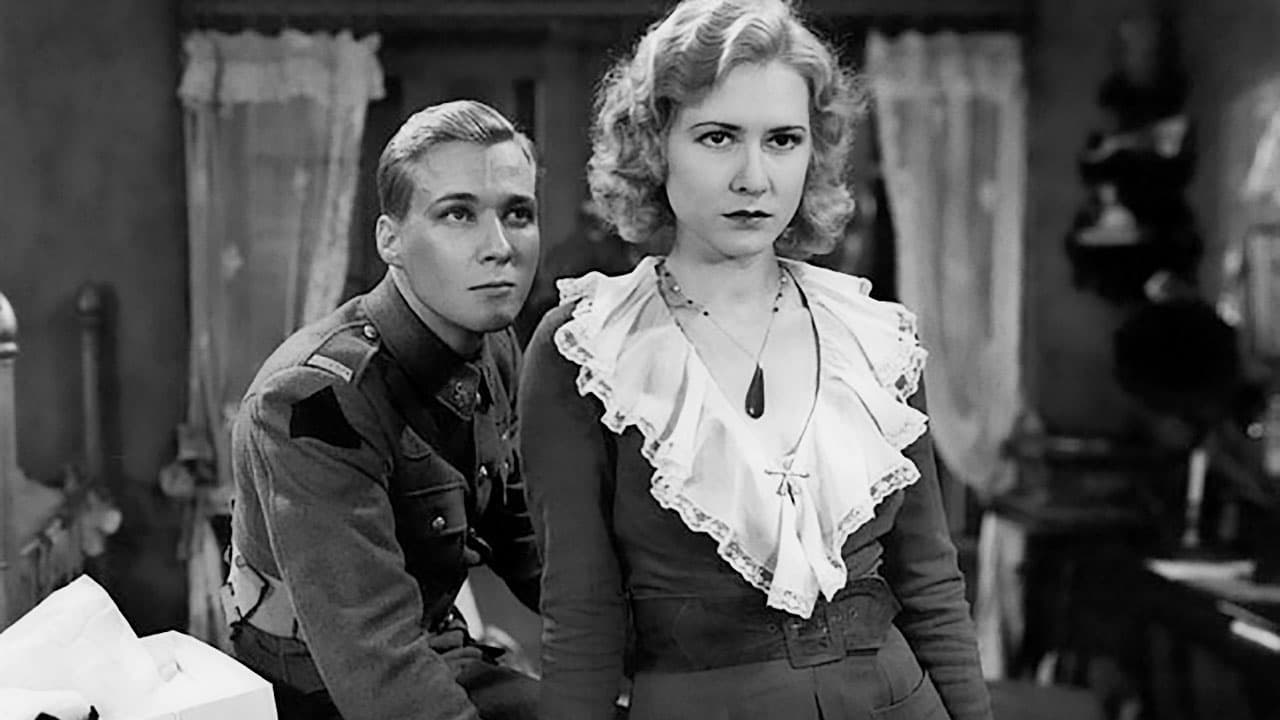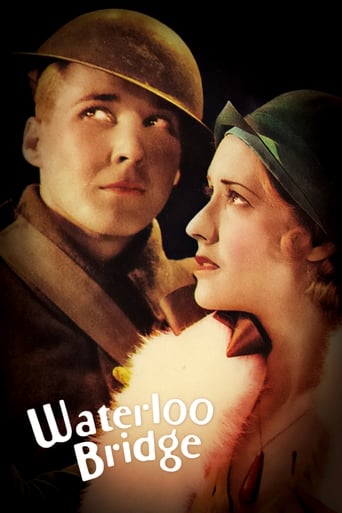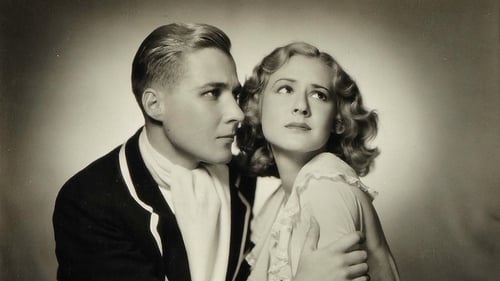


Instead, you get a movie that's enjoyable enough, but leaves you feeling like it could have been much, much more.
... View MoreThe movie turns out to be a little better than the average. Starting from a romantic formula often seen in the cinema, it ends in the most predictable (and somewhat bland) way.
... View MoreA terrific literary drama and character piece that shows how the process of creating art can be seen differently by those doing it and those looking at it from the outside.
... View MoreBlistering performances.
... View MoreThis is the best of the filmed versions of this story. There isn't a lot of plot in this gritty, earthy early talkie but there is an astonishingly powerful tour de force performance by Mae Clarke. I had always admired her fragile beauty and strong second lead performances in many films over the years but I'd never seen this one in which she plays a prostitute or "party girl" as they used to call them in the early sound films, a girl who is forced into prostitution in London after her show closes and she cannot get decent work. There's a blitz going on and zeppelins are reigning bombs down onto London streets and people must take shelter underground. Life is extremely difficult but onto the scene comes American Douglass Montgomery whose family, wealthy as can be, live outside of London on a marvelous estate and his sister turns out to be none other than Bette Davis. Will the family accept her? Will she tell them she is a street walker? The drama unfolds and gradually grips you fully if you like pre-code movies. Montgomery and Clarke as the young lovers have a real chemistry between them. Clarke's performance totally inhabits her space as she handles objects, uses her entire body in her performance and shows a remarkable range of emotion that seems to ripple through her entire body. I had the feeling that the actress was almost possessed by the spirit of her character. At times quiet and introspective,she then her emotions rush to the forefront and in one near final scene she belts out her anguish with astonishing power and range that blew me away. I take this to be one of the great acting performances in the history of movies and it is absolutely THE most underappreciated Academy Award quality performance ever given. You may not agree but over the last 46 years I've been teaching film history at the university level and I'd stake my reputation that for its period of time there isn't anything quite like it. It is whole decades ahead of its time. You may marvel as I did at how modern her acting is and not stilted or theatrical as her contemporaries such as Bette Davis come across now. It is a performance that one would marvel at if given today. And yet her projection is also worthy of a great stage performance as well, for this is also after all basically a filmed play. James Whale is always a fascinating director. What he coaxed out of Mae Clarke in this film is something for the ages and any acting student can learn a lot about how to move about a room, use your hands, modulate your voice and use every part of your body to create a real character. It is all the more extraordinary that Whale did this in just a few weeks and with a shoestring budget. After the film I just sat for a while in rapt amazement, so grateful that this performance has been captured on film and I had the privilege to watch it. In a word, wow!.
... View MoreThis original version of the Robert Sherwood play is quite different than the more famous MGM remake starring Vivien Leigh and Robert Taylor. The story is more efficiently told, and without flashbacks, such that this film is nearly half an hour shorter.It was directed by James Whale, and the screenplay was written by Benn Levy and Tom Reed. The most notable aspect of this movie is Mae Clarke's terrific performance as the conflicted streetwalker Myra Deauville; Kent Douglass aka Douglass Montgomery is pedestrian as the soldier from a wealthy family she meets, Roy Cronin, who's unaware of her (oldest) profession.Whereas the later film version of the play has Myra and Roy meet and fall in love before she turns to prostitution, as her only means of support, after she's been led to believe that he's died in the war, in this one they meet after the former chorus girl had already been walking the streets for a couple of years, with friend Kitty (Doris Lloyd). Myra meets Roy on the titled London bridge during an air raid while both help an old woman (Rita Carlisle aka Carlyle) to the safety of a shelter. They then spend some innocent time together in her shabby apartment, interrupted by her landlady Mrs. Hobley (Ethel Griffies), who'd earlier asked for Myra's back rent. Naive Roy sees Myra as an out of work chorus girl who's just down on her luck, but she refuses to take advantage of his innocence, is insulted by his offer to pay her bills, and even throws him out, before they reconcile briefly and he leaves on friendlier terms.Roy is only nineteen, and even though he's no longer under the illusion that the war in France is a fun adventure, he's still worlds away from the weary realist that Myra has become. In their brief time together, Roy fell hopelessly in love with Myra and he pursues her with flowers and a new pink dress she'd mentioned in that prior meeting. Neighbor Kitty emboldens Roy's savior complex, and plants the seed that all Myra needs is a (wedding) ring. Later, Roy tricks Myra into visiting his family's estate in the country, where she reluctantly meets his mother Mary (Enid Bennett), sister Janet (Bette Davis), and father-in-law Major Fred Wetherby (Frederick Kerr). Ruth Handforth plays Augusta, their maid. Roy's family welcomes her with open arms but Myra's guilt about "what she is" causes her to tell Mary that she's not really a chorus girl. The next day, it's clear that Mary hasn't told the others what Myra had shared about her life. Finding herself still accepted among Roy's family is too much for Myra and, still feeling unworthy, she flees back to London by train.Myra is conflicted, she tries but can't seem to go back to doing what she always had. Roy returns to Myra's apartment in London, but finds only Mrs. Hobley, who tells him what he didn't know about the woman with whom he'd fallen in love. But still, he searches for her. Myra successfully avoided Roy until she can't help but try to glimpse him as his regiment meets to leave for the front on Waterloo Bridge. He sees her and makes her promise to marry him when he returns. An air raid begins just as the troop truck has driven away, and Myra is killed by a bomb dropped from a German Zeppelin (in lieu of Leigh's suicide) as the film ends, her monogrammed purse and white fox fur lay on the pavement.
... View MoreSince the story is so well known by some of the very good reviewers here, I am merely adding my surprise at the discovery of the talent of Mae Clarke. I had no idea she had done this original version and according to the collected IMDb data, Ms. Clarke was just 20 years old when she worked on this excellent adaptation of the play. There is no need to compare her performance to Vivien Leigh's later remake, because that film had no real grit and Clarke's performance was one of the best I have ever seen from a performer despite her youth. The film was shot soon after talkies began and her screen presence and non theatrical emoting was astonishingly on target. The director, Whale, must have had a good rapport because her scenes with all of the players came off honest and not a bit dated. I can see that Davis would have liked to play the part as someone mentioned, but she could not have done a better job. I just discovered it on the Turner channel and became so engrossed in Clarke's performance, I called people to get a copy and watch this actress' work. Quite remarkable.
... View MoreI'm pretty certain James Whale is one of my favorite directors. Potential pulp trash like "Frankenstein", "Bride of Frankenstein", and "The Old Dark House" were elevated to near-masterpieces (and in the case of the latter, a true masterpiece in my humble estimation) thanks to brilliant screenplays and Whale's wonderful, tasteful direction and sensibilities. "The Invisible Man" is still one of the best science fiction films ever made, and quite possibly the best Wells adaptation around, with the possible exception of "Island of Lost Souls". "Remember Last Night?" is a daring, hilarious, fascinating slice of unexpected social satire in the guise of a mystery-comedy, and remains woefully under-seen."Waterloo Bridge" is yet another immensely satisfying Whale film, and while (this being his second film) his technique is not at the same level as some of his later films, the film is still directed tastefully and often creatively, and is very well-shot as well. This was a pre-code film and hence I imagine is less sanitized than the 1940 Vivien Leigh/Robert Taylor version of the story. Mae Clarke is absolutely incredible here as a chorus girl-turned-prostitute who meets a naive 19 year old Canadian in wartime London. The writing is fantastic and the film, while melodramatic, is also subtle and tasteful in many regards. The humor (which is present in nearly all Whale films) is a lot of fun, and doesn't clash with the otherwise serious tone of the film."Waterloo Bridge" avoids the pitfalls of many melodramas by remaining a very human story about love at its core. The ending is really over-the-top, perhaps even a bit laughable, but it doesn't ruin what came before: a really great pre-code melodrama, and another exceptional film directed by James Whale. It's a good production (although the Waterloo Bridge set is not very convincing now, of course) with excellent direction, good cinematography, great writing, and a wonderful cast, especially the two leads Mae Clarke and Douglass Montgomery, but also the wonderful character actor Frederick Kerr in a smaller, more humorous role.
... View More